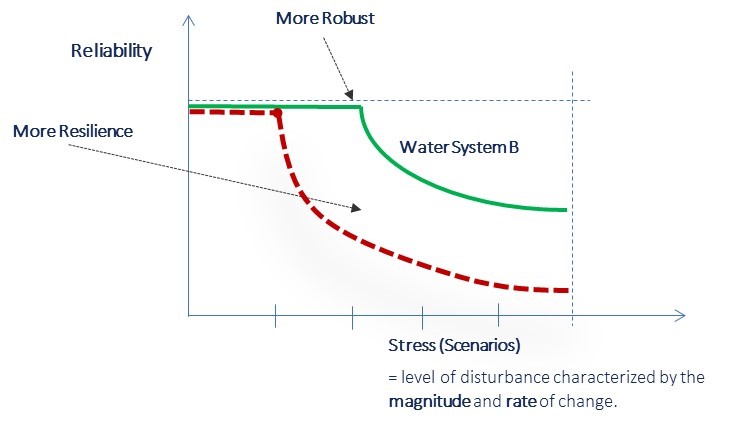SYSTEMS THINKING IS AT THE HEART OF THE WORK WE DO
To be able to identify interventions and improvements in the water cycle, from the catchment to the tap and from the tap to the recipient, and identify opportunities for more circular and resilient systems we develop whole system modelling tools (e.g UWOT) and also use Agent Based Modelling to simulate the social component (citizens, authorities, decision makers, funders) of the complete socio-technical urban environment.
This focus on simulating urban flows and the city’s ‘metabolism’ allows us to compare distributed solutions (e.g. reuse and recycling at several scales), such as Sewer Mining and Nature Based Solutions to more traditional, piped and grey infrastructure options within a context of integrated asset management. Of special interest are hidden costs and benefits from these alternative approaches, such as ecosystem services that can alter the decision landscape for urban decision makers. As part of this work, we also developed, together with end users and our strategic partners an operational definition of resilience for urban water systems and infrastructure that takes the form of a stress-test of any system against (unknowable) futures.

RELEVANT PUBLICATIONS
- Bouziotas, D., van Duuren, D., van Alphen, H.J., Frijns, J., Nikolopoulos, D. and Makropoulos, C., 2019. Towards circular water neighborhoods: Simulation-based decision support for integrated decentralized urban water systems. Water, 11(6), p.1227.
- Koutiva, I. and Makropoulos, C., 2016. Modelling domestic water demand: An agent based approach. Environmental Modelling & Software, 79, pp.35-54.
- Koutiva, I., Lykou, A., Pantazis, C. and Makropoulos, C., 2020. Investigating Decision Mechanisms of Statutory Stakeholders in Flood Risk Strategy Formation: A Computational Experiments Approach. Water, 12(10), p.2716.
- Makropoulos, C., 2017. Thinking platforms for smarter urban water systems: fusing technical and socio-economic models and tools. Geological Society, London, Special Publications, 408(1), pp.201-219.
- Makropoulos, C., Nikolopoulos, D., Palmen, L., Kools, S., Segrave, A., Vries, D., Koop, S., Van Alphen, H.J., Vonk, E., Van Thienen, P. and Rozos, E., 2018. A resilience assessment method for urban water systems. Urban Water Journal, 15(4), pp.316-328.
- Makropoulos, C., Rozos, E., Tsoukalas, I., Plevri, A., Karakatsanis, G., Karagiannidis, L., Makri, E., Lioumis, C., Noutsopoulos, C., Mamais, D. and Rippis, C., 2018. Sewer-mining: A water reuse option supporting circular economy, public service provision and entrepreneurship. Journal of environmental management, 216, pp.285-298.
- Nikolopoulos, D., Kossieris, P. and Makropoulos, C., 2021, March. Stochastic stress-testing approach for assessing resilience of urban water systems from source to tap. In EGU General Assembly Conference Abstracts (pp. EGU21-13284).
- Nikolopoulos, D., van Alphen, H.J., Vries, D., Palmen, L., Koop, S., van Thienen, P., Medema, G. and Makropoulos, C., 2019. Tackling the “New Normal”: A resilience assessment method applied to real-world urban water systems. Water, 11(2), p.330.
- Rozos, E. and Makropoulos, C., 2013. Source to tap urban water cycle modelling. Environmental modelling & software, 41, pp.139-150.


